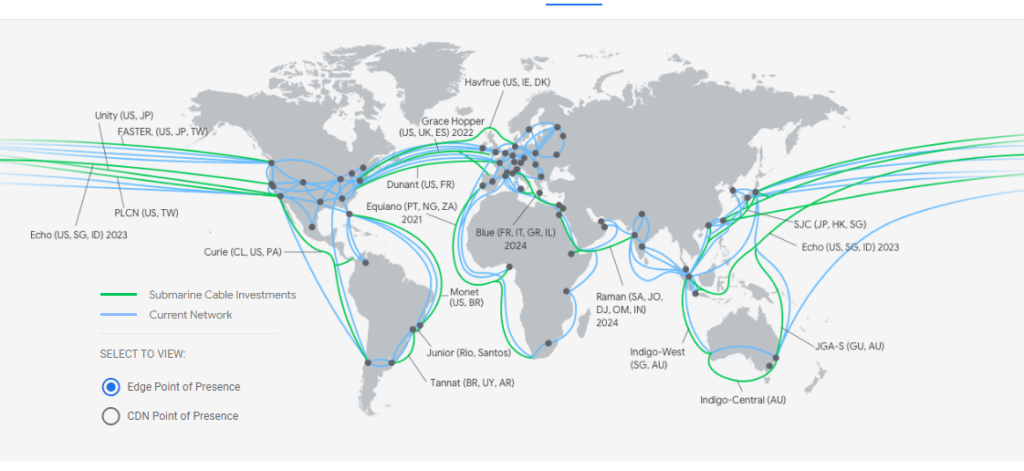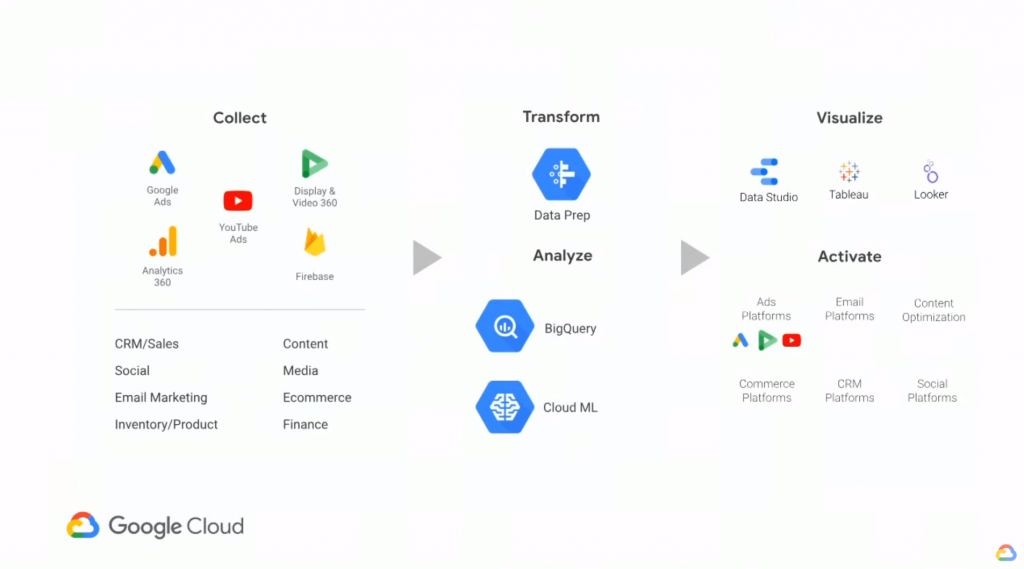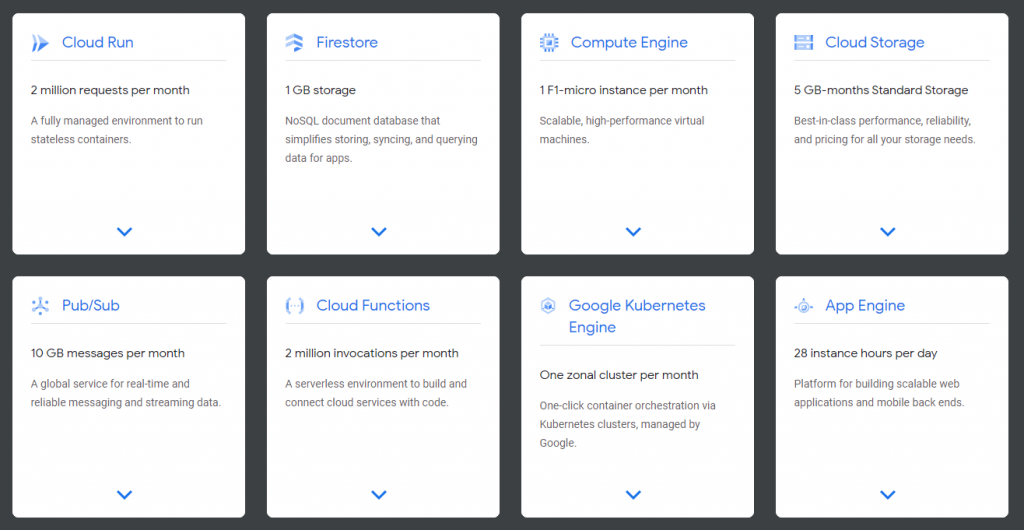Let’s say you have a promising startup idea. But what’s next? How to bring the concept to market?
Apart from formal issues, such as registering a company or obtaining financing, it is important to design the product well. Especially when you’re developing an IT startup that will leverage new technologies like Cloud Computing, Big Data, or Machine Learning solutions. In that case, choosing the right technology stack is crucial – hardly any founder wants to allocate limited resources to significant refactoring tasks or rewriting the application code after a few months.
Infrastructure is the basis for development. And here are 15 reasons why you should choose Google Cloud solutions as your startup’s foundation.
See also:
Cloud technologies made simple. What is cloud computing and what can you gain from it?
Corporate cloud – everything you need to know before implementation
What is the Google Cloud Platform and how does it support business?
1. A set of scalable services. Technology won’t slow down the growth
Google Cloud Platform is a set of nearly 200 cloud services, such as:
- virtual machines with almost unlimited computing capacity,
- platforms as a service, enabling rapid implementation and development of applications, also containerized apps,
- Kubernetes cluster orchestration tools,
- cloud databases and cloud storage,
- Big Data analytics services,
- pre-trained Machine Learning and Artificial Intelligence models,
- Internet of Things development platform.
As an app creator, you can freely choose between services to tailor infrastructure to a startup’s needs. Having ready-made cloud solutions at your fingertips – with a few clicks in a console or a few lines of code in the command line – enables you to smoothly shape your product.
Every Google Cloud Platform service is scalable. It scales up or down, adjusting capacity to meet real-time demand. After some time, as your app becomes more popular and the number of new functionalities or users grows, you don’t have to look for a room on different infrastructure; you can keep up the GCP services you’ve once chosen, but reconfigure them to greater values.
2. Cost flexibility. You pay only for what you use
The mentioned scaling options translate into cost flexibility. In Google Cloud Platform, you pay for resources you use, in most cases in a per-minute or even per-second manner. During months when your product has low traffic and consumes little compute power, your cloud bill will be low as well. If your app gets visited by thousands of users, the relevant services will immediately scale up, so every guest is served without any issues. Thus, the fee increases, but lowers as soon as the demand drops.
3. Google Cloud network enables global expansion
Google expands its network of fibre-optic connections between data centres. The company keeps the world’s longest subsea fibre cable – 9,000 kilometres long – routed along the bottom of the Atlantic Ocean between the Oregon coast and Japan. Thus, Google Cloud creates an ultra-fast network with data transfer speed up to 10 Tb/s, which translates into service efficiency and global availability.

If your startup plans to expand to foreign markets – in Europe and beyond – and you want to ensure the app’s performance and high availability, you should choose Google Cloud Platform as a core infrastructure solution. With just a few clicks, you can set up instances in the desired location, even in the other hemisphere.
4. A container-friendly environment
I bet everyone who has ever dealt with containers, knows Kubernetes. This open-source orchestration platform was created and launched by Google in 2014. Currently, it is developed by the Cloud Native Computing Foundation, and Google provides it in the as a service model, as a managed Google Kubernetes Engine service.
Many users of the Google Cloud Platform point out that this is an especially friendly environment for the development of containerized applications. One of FOTC’s customers – a founder of feeCOMPASS startup – said:
GCP focuses much on solutions like Kubernetes, which provides the necessary support in areas such as high availability or rolling updates. This is a great value for a startup. – Piotr Buszka, co-founder of feeCOMPASS
Check out feeCOMPASS case study: E-commerce sales increase thanks to merging sales knowledge with artificial intelligence
5. Focus on development with serverless services
The main resource in a startup is time, and this resource in most cases is quite limited. Therefore, a wise founder seeks sensible process optimization opportunities. Google Cloud Platform provides serverless (known also as PaaS) services that take over infrastructure maintenance works from software engineers, allowing them to focus on inventing and writing new functionalities. GCP portfolio has a few solutions that automate infrastructure operations:
- App Engine – a fully managed application platform that allows developers to code in popular programming languages (or any other technology if containerized) and run deploys by simply posting a gcloud app deploy command in the GCP console. App Engine gets files, transfers them to the cloud and manages all infrastructure – load balancing, scaling up and down, or updating security patches;
- Cloud Run – a service dedicated to quickly deploying static HTTPS containers, which allows software engineers to create code using any programming language, framework, or library. Cloud Run scales automatically, and a fee is charged with an accuracy of 100 ms;
- Cloud Functions – Function as a Service product, which allows treating all Google and third-party cloud services as building blocks. The service enables software engineers to connect and extend the blocks with code, and rapidly move from concept to production with end-to-end solutions and complex workflows.
6. BigQuery – a real deal for data-driven startups
BigQuery is a serverless, scalable data warehouse solution that is capable of storing and analysing terabytes of data in seconds. It supports Big Data projects and makes predictions possible thanks to built-in machine learning and artificial intelligence integrations.
The service can be used to enhance an analytical product by bringing demanded data closer and faster to an app’s users; can also deliver personalised customer experiences using real-time insights, or be the heart of a data warehouse system for a company’s internal needs.
7. Innovation at your fingertips. ML and AI capabilities
Google Cloud Platform offers a cloud environment for building and training machine learning and artificial intelligence models, as well as already made, pre-trained ones. That enables you to develop innovative solutions faster. ML and IA, combined with other GCP services, can enrich your product with among others:
- written or spoken natural language communication feature (e.g., a custom-made chatbot or IVR system),
- software that reads interlocutor’s intent and provides a call centre specialist helpful questions or relevant guide materials,
- a system that leverages computer vision to support the quality control process by identifying potential breakage.
Google is also a founder of TensorFlow – an end-to-end open-source platform with a set of tools and libraries dedicated to creating, training and managing Deep Learning models. TensorFlow’s technology can integrate with GCP’s ML and AI services.
8. Internet of Things and Industry 4.0 solutions
One of the hundreds of tools available in CGP is Google Cloud IoT – a platform dedicated to unlocking insights from global device networks and advancing Internet of Things projects. The platform contains tools such as IoT Core for device connection and management, Dataflow for streaming and batch analytics, and BigQuery for data warehouse and fast querying. Using these components as building blocks, startups can create solutions driving the Industry 4.0 revolution – predictive maintenance, real-time asset tracking, logistics and supply chain management systems or smart cities and building design.
9. Firebase platform for mobile app creators
If a startup sets up a mobile application, it should take a look at the possibilities of Firebase.
Firebase is a platform managed by Google, with GCP-based services dedicated to building apps, releasing and monitoring, and increasing user engagement. With Firebase, you can develop native applications for Android and iOS, as well as Progressive Web Apps.
Firebase services should take the burden off developers’ shoulders. They are like ready-made blocks, that allow faster creation of an efficient application. Available cloud tools include:
- blazing-fast hosting backed by a global CDN,
- real-time NoSQL database for immediate storing and syncing data between users,
- machine learning features with ready-to-use APIs,
- set of physical and virtual mobile devices available online to remotely test an app,
- a system of tracking crashes and collecting information about OS and device on which an error has occurred,
- solutions to send push notifications as well as targeted and contextual messages inside an app,
- an option to run A/B tests and analyse users’ behaviour on comprehensive dashboards
- a service that enables introducing changes to an app without releasing a new version.
10. Documentation, resources and training
Google Cloud solutions have been designed to be as intuitive in use as possible. Nevertheless, Google offers training kits, an extensive knowledge base and access to a moderated community.
The Get Started subpage is a place where a Google Cloud newbie should land first. It guides you through product documentation, code samples, best practices and tutorials to learn how to build on GCP. There are resources on cloud migration, cloud adoption or security and privacy.
The cloud provider also publishes educational content on YouTube. The official Google Cloud Tech channel features plenty of videos describing GCP services and possible ways of use, tutorials, business cases, and recorded speeches from various events and conferences.
Google Cloud also allows learning from paid courses on platforms such as:
- Qwiklabs with over 300 hands-on exercises in the Google Cloud Platform training console,
- Pluralsight for improving technical skills through a range of training paths and assessments of Google Cloud service skills,
- Coursera, with more than 200 courses branded by Google.
Google for Startups Cloud Program includes discounts or even free credits to be used on training platforms.
11. Better collaboration and work organisation with Google Workspace
It’s worthwhile for companies that set up with Google Cloud Platform to consider the second leading cloud solution – the Google Workspace collaboration and productivity toolkit.
Google Workspace includes:
- Gmail – a company mail in @YourStartupName domain,
- an online Google Calendar that allows planning meetings and joint activities at ease,
- Google Chat for immediate communication – one on one as well as in groups,
- Google Meet – a videoconference platform with streamlined functionalities like separate rooms, surveys, or interactive whiteboards,
- Drive in the cloud,
- Google Docs, an online document editor in which many people can cooperate at once,
- Google Sheets for creation and edition of online spreadsheets,
- Google Slides, an app allowing you to design and run multimedia presentations,
- Google Forms, an online surveys creator and tool for analysing results in real time.
Google Workspace enables efficient remote collaboration, control over company files and document versioning. All changes are visible to contributors immediately and saved in file history. There’s no need for madly pressing Ctrl + S or resending an email with an edited file for the fifth time. All documents are stored online on well-secured Google Drive, and startup employees can access them from any device with an internet connection. A Google Workspace administrator controls all resources in an organisation, roles and permissions, and has access to information about files shared outside the domain.
Here you can learn more about Google Workspace.
12. In the backyard of a major marketing player
Finishing with an MVP creation doesn’t mean you can rest on your laurels. Advertising, reaching new customers and building their loyalty is important as well.
Google is an undoubted leader in the field of digital marketing. Besides products that we use every day (Chrome browser, Google search engine, or YouTube service), the company develops tools for advertising such as Google Marketing Platform, Google Ads or Google Analytics. It also provides free courses and resources to explore the potential of digital marketing.
Using GCP, you can import data from Google marketing tools, databases, or external applications to BigQuery – a cloud data warehouse solution. The service allows analysing various input types, discovering connections and getting marketing insights. Results can be shown on interactive dashboards on Looker on Data Studio platforms. Moving forward, you can return to your marketing tools to set up new campaigns, implement optimizations, or run A/B tests.

13. Local Google Cloud Partner support
Google Cloud has a global network of partners – companies that operate in local markets to be closer to cloud users, solve their problems faster and teach them how to benefit from the cloud. Those companies, in order to achieve and maintain the partner badge, must meet a set of specific requirements, constantly acquire knowledge and skills, and regularly take official certification exams.
As an official Google Cloud Partner, FOTC supports its customers by:
- infrastructure review and implementation of best practices in order to lower costs, improve performance, or increase the level of security,
- assistance in developing a cloud migration plan and presence at every stage of its execution,
- providing additional tools created by the team,
- identifying further possibilities of cloud cost optimization,
- conducting training courses and supplying customers with learning materials,
- possible cooperation in marketing activities.
Would you like to find out more about the benefits of working with FOTC? Drop us a line!
14. Cost savings with discounts and free usage quotas
A startup can take advantage of other cost optimization possibilities on the Google Cloud platform, such as:
- Spot VMs in Compute Engine service – a short-lived compute instance that can reduce GCE costs by up to 91%,
- committed use discounts (CUDs) that provide up to 70% discounted prices in exchange for a commitment to use a minimum level of agreed resources,
- sustained use discounts (SUDs), discounts of up to 30% that apply automatically if a cloud service runs non-stop,
- Free Tier – free monthly quotas of the most popular GCP services, including Compute Engine, App Engine, Google Kubernetes Engine, Cloud Run, Cloud Functions, BigQuery or ML and AI solutions.

15. Programs for startups with financial and knowledge assistance
FOTC, alongside educating about Google Cloud, runs programs dedicated to startups. New companies can gain:
- discounts for Google Cloud solutions,
- free credits to spend on GCP services,
- access to training courses and learning materials,
- mentoring from experienced startup founders and CEOs,
- support of cloud engineers and architects,
- an invitation to a moderated community of Google Cloud products users.
Would you like to give your business a good start in the cloud? We’ll be delighted to share our knowledge and skills. Ask what we can do to accelerate your growth.
